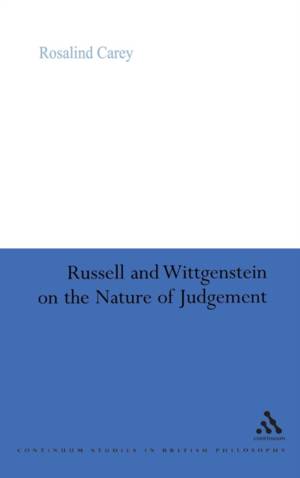
Door een staking bij bpost kan je online bestelling op dit moment iets langer onderweg zijn dan voorzien. Dringend iets nodig? Onze winkels ontvangen jou met open armen!
- Afhalen na 1 uur in een winkel met voorraad
- Gratis thuislevering in België vanaf € 30
- Ruim aanbod met 7 miljoen producten
Door een staking bij bpost kan je online bestelling op dit moment iets langer onderweg zijn dan voorzien. Dringend iets nodig? Onze winkels ontvangen jou met open armen!
- Afhalen na 1 uur in een winkel met voorraad
- Gratis thuislevering in België vanaf € 30
- Ruim aanbod met 7 miljoen producten
Zoeken
Omschrijving
In 1911 Bertrand Russell began a historically formative interchange about the nature of logic and cognition with his student, Ludwig Wittgenstein. In 1913, Russell set to work on a manuscript, the Theory of Knowledge, designed to move from the analysis of perception to judgment and on to knowledge of the world. After Wittgenstein interrupted Russell's daily writing with a series of objections to his doctrine of judgment and conception of logic, Russell abandoned his project in despair, leaving it unfinished. His subsequent work can be understood largely as an attempt to assimilate and respond to Wittgenstein's challenge in 1913. Russell and Wittgenstein on the Nature of Judgement is the first book-length treatment of Russell's decisive 1913 exchanges with Wittgenstein. Rosalind Carey incorporates little-known notes and diagrams into a new analysis of the problems Russell was facing. She also evaluates the numerous interpretations of Russell's positions and Wittgenstein's objections to them. The result is a new perspective on both these great thinkers, at a crucial point in the development of twentieth-century philosophy.
Specificaties
Betrokkenen
- Auteur(s):
- Uitgeverij:
Inhoud
- Aantal bladzijden:
- 160
- Taal:
- Engels
- Reeks:
Eigenschappen
- Productcode (EAN):
- 9780826488114
- Verschijningsdatum:
- 24/07/2007
- Uitvoering:
- Hardcover
- Formaat:
- Ongenaaid / garenloos gebonden
- Afmetingen:
- 163 mm x 234 mm
- Gewicht:
- 371 g

Alleen bij Standaard Boekhandel
+ 678 punten op je klantenkaart van Standaard Boekhandel
Beoordelingen
We publiceren alleen reviews die voldoen aan de voorwaarden voor reviews. Bekijk onze voorwaarden voor reviews.











